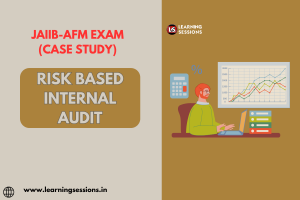The Junior Associate of the Indian Institute of Bankers (JAIIB) examination offers banking professionals with the insight needed to manage complex financial and operational challenges. Within the Accounting and Financial Management (AFM) module, the concept of Risk-Based Internal Audit (RBIA) is a pivotal topic, as it aligns with modern risk management practices and enhances the governance framework of financial institutions. Learning Sessions will take you through this article on the case study that explores the concept of risk based internal audit.

📚 JAIIB Study Resources 📚
👉 Check Here
👉 Check Here
👉 Check Here
👉 Get Tests Here
👉 Check Here
DOWNLOAD PDF RISK BASED INTERNAL AUDIT -CASE STUDY
RBIA is an audit approach that prioritizes high-risk areas in an organization, ensuring that resources are focused on processes and activities that pose the greatest potential threats. Unlike traditional audits, which focus on routine checks and compliance, RBIA evaluates the effectiveness of risk management strategies and their alignment with organizational goals.
For the extensive preparation of candidates, get details through our YouTube videos for JAIIB AFM Module wise Syllabus with explanations and tips to help candidates in their preparation journey.
You may also like these JAIIB case studies:
JAIIB | AFM | TYPES OF COST
JAIIB | AFM | ELEMENT OF COST
Key Features of RBIA:
- Risk-Focused Approach: Concentrates on critical areas with significant impact.
- Dynamic Process: Adapts to changes in the risk environment.
- Alignment with Strategic Goals: Ensures that risk management supports business objectives.
- Proactive Audit Planning: Anticipates potential issues rather than reacting to incidents.
In the banking sector, where risks are multifaceted and regulations stringent, RBIA plays a crucial role in:
- Enhancing Risk Management: Identifying and mitigating potential risks effectively.
- Improving Governance: Strengthening oversight mechanisms and accountability.
- Ensuring Compliance: Aligning operations with regulatory and policy requirements.
- Optimizing Resources: Allocating audit efforts to areas with the highest risk exposure.
To summarize, Risk-Based Internal Audit (RBIA) represents a modern approach to internal auditing, making sure that banks remain resilient in an evolving risk landscape. Through the JAIIB AFM module, banking professionals gain a global understanding of RBIA’s principles and practices, enabling them to contribute to their institution’s success by mitigating risks, ensuring compliance, and fostering a culture of accountability. Learning Sessions provides additional information about JAIIB AFM COSTING TECHNIQUE by giving examples of real life scenarios.
Learn more about this case study through our YouTube channel and PDF.
Get access to our Telegram Channel for free Pdfs of JAIIB.





